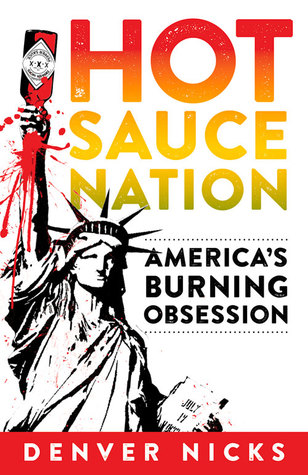 Hot Sauce Nation showed up on a Buzzfeed list of gifts for hot sauce lovers. My stepfather is a hot sauce lover, so I clicked into it, and being a book lover myself, the book jumped out at me. So I bought it for some light weekend reading. After slogging through Jonathan Strange & Mr. Norrell, the light non-fiction of Hot Sauce Nation was refreshing, and it was a pretty decent book overall.
Hot Sauce Nation showed up on a Buzzfeed list of gifts for hot sauce lovers. My stepfather is a hot sauce lover, so I clicked into it, and being a book lover myself, the book jumped out at me. So I bought it for some light weekend reading. After slogging through Jonathan Strange & Mr. Norrell, the light non-fiction of Hot Sauce Nation was refreshing, and it was a pretty decent book overall.In this book, Nicks endeavors to explain how hot sauce became such a national phenomenon. To this end, I'm not entirely sure he succeeds, but I do believe that he provides a lot of fun information about hot sauce, the people who make it, and the people who love it along the way. He talks about self-proclaimed "chiliheads," who love all things spicy, and a number of small hot sauce making operations, as well as short looks at two of the larger ones, Huy Fong Foods' sriracha or rooster sauce and the ever-present Tabasco. He even talks about the Washington, DC region for a good portion of time in two different places. First, he talks about the fish pepper, a type of chili that was grown in the Chesapeake Bay area and is now on the verge of extinction because people haven't seen a continuing use for it, but which is still grown and used in a sauce by a small operation in Baltimore. It had me Googling away, looking for where I could find a bottle of this mysterious sauce, but to no avail. And later in the book he talks about mumbo sauce! This is a sauce that's very popular in the less-affluent areas of DC, though there appears to be debate of whether it's actually native to the area of not. It's more of a sweet sauce than a spicy one, which makes its inclusion in this book somewhat puzzling, but still.
Nicks has a way of talking about food and people that is deeply inviting, though his asides and his own narrative format, at times, tend to the "frat boy" end of the spectrum. He is also easily distracted. One chapter of the book talks more about an interesting character by the name of Baron Ambrosia than about hot sauce or chilies. Nicks tries to integrate this by saying how Ambrosia was trying to get a hot sauce certification system up and running, complete with member cards to show that you really, really love spicy food, as hot as it can be, but this never actually got up and running so it's a rather poor sort of inclusion. He also makes some questionable decisions about places to praise; for example, he lauds the Anchor Bar in Buffalo, NY, the ostensible birthplace of the buffalo wing (like with mumbo sauce, this appears to be up for some debate) but anyone from that region knows that, while the buffalo wing might have originated at the Anchor Bar (maybe), it certainly wasn't perfected there, and going to the Anchor Bar for buffalo wings (or just "wings," as they are known locally) is one of the surest ways to mark yourself as a tourist rather than a serious wing eater.
Still, I think this was a worthy read. It's short, less than 300 pages and with only about 75% of it being actual book content rather than a bibliography and other end content, but it was enjoyable. It even inspired me to make my own hot sauce--no recipes are included here, but a bit of searching on the internet ultimately led me to an easily-customized one that is now aging away in my fridge as a homemade Christmas present. (It has to sit for 2 weeks before use). If you like spicy foods, even if you're not a self-proclaimed "chilihead" (I am certainly not.) this is a good, light nonfiction book to add to your shelf.
4 stars out of 5.